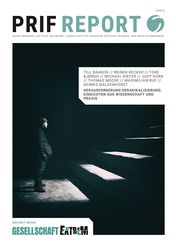The challenge of deradicalization
Despite the fact that research on the topic of "radicalization” has been thriving, very few practical findings applicable to deradicalization work have emerged from research in this area. Not only do we a lack overview studies, the existing literature also remains incoherent. Both in Germany and abroad, different understandings and attempts at systematization are being used simultaneously. The key practitioners, researchers, (security) agencies and policy-makers do not utilize standardized definitions nor are they in agreement about what deradicalization means (in practical terms).
In this study, deradicalization is understood to be a process through which theextreme views held by a radicalized individual are gradually addressed one by one based on the existing needs and eventually rejected. This by no means implies a reversal of the radicalization process but, rather, a strengthening of resilience throughincreased tolerance towards ambiguities as the core element of successful deradicalization.
Specific working fields for extremism prevention and deradicalization work include:
- “counseling for family members and one’s social environment” with the aim of supporting and raising awareness among those in the social environment of a potentially radicalized or radicalizing individual and those with close professional contact to young people (such as teachers);
- (follow-up) offers of direct counseling and support for (partially) radicalized individuals and those at risk of radicalizing, initially on the basis of street work and increasingly by way of multipliers;
- support for exiting radicalized groups and offering stability for radicalized individuals, aimed at distancing and, ideally, ending in complete deradicalization;
- online deradicalization work as a relatively new working field with various approaches currently being tested out in pilot and model projects.
The landscape of supporting agencies active in the area of extremism prevention in Germany holds as much diversity as the country’s federal state system itself. This reality poses a number of challenges in terms of practical (cooperation) work. The hybrid model comprised of responsibilities divided among state and civil society actors that currently exists in Germany can be assessed as a promising opportunity for extremism prevention, if properly carried out. The same applies for the diversity of approaches and profiles among counselors. So far, however, these opportunities have been underutilized for reasons such as divergent aims pursued by the respective stakeholders.
The report (in German)
[Translate to English:]
PRIF Report 9/2018
Herausforderung Deradikalisierung: Einsichten aus Wissenschaft und Praxis
Till Baaken // Reiner Becker // Tore Bjørgo // Michael Kiefer // Judy Korn // Thomas Mücke // Maximilian Ruf // Dennis Walkenhorst
The film (German w/ English subtitles)
Policy recommendations
- Expanding control structures, such as in education and youth welfare work, has the potential to create the necessary basic structures that can eliminate the need for performing deradicalization work in the first place. Providing training and qualifications for staff members in institutions such as schools, correctional facilities, probationary services and even kindergartens could sustainably create the expertise needed to recognize radicalization early on and address radicalization as well as those at risk of radicalizing.
- Long-term financing mechanisms for equitable work performed by state and civil society actors must be secured. The diversity of challenges confronting actors engaged in the field of prevention and deradicalization can only be addressed on the basis of well-founded, long-term work approaches that are resilient and capable of adapting. This requires long-term and open-ended financing in terms of model projects. Persistent fears of budget cuts and job losses among the organizations and staff active in this field cannot be tolerated: sustainable and effective work in this area does, after all, rely on the existence of trust between counselors and their clients, which can often take years to fully establish.
- Legal frameworks must be defined. One example here is the urgent need for the “right to refuse to give evidence” beyond the trust established between counselors and their clients. As the area of prevention and deradicalization work is of such great importance for security, legal frameworks must be more clearly defined for the very sake of protecting staff members and the public in general.
Project members
Coordination
- Judy Korn, Thomas Mücke
Violence Prevention Network (VPN), Berlin
Team
- Till Baaken
Violence Prevention Network (VPN), Berlin - Reiner Becker
Universität Marburg - Tore Bjørgo
University of Oslo - Michael Kiefer
Universität Osnabrück - Maximilian Ruf
Violence Prevention Network (VPN), Berlin - Dennis Walkenhorst
Violence Prevention Network (VPN), Berlin
